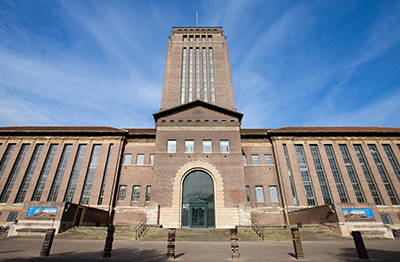When I first applied
for an internship at the UL Cambridge, I didn’t expect to get a glimpse into
such a diverse landscape of libraries which is part of a university that is at
the least just as diverse! Having studied Literature at the University of Tübingen
in southern Germany, having started my PhD in Cultural Studies in
Frankfurt/Oder and working now in the Berlin State Library while getting
another master’s degree in Library- and Information Sciences from the
Humboldt-University in Berlin, I thought I knew what to expect. But Cambridge
doesn’t work like most other universities. Here, there’s not only the UL, the
faculty and departmental libraries but also quite a few college libraries: That
means that the entire system works differently and whilst in Germany more or
less every person working in a library is called “librarian”, Cambridge offers
that title but to the heads of libraries.

cc-by-sa Martin McCormick https://bit.ly/2CQpI5V
However, after two weeks in varied
departments of the UL, I got the chance to spend one week in the Marshall
Library and that was quite distinct from what I am used to!
© Marshall Library
The day starts off
rather calm in the Marshall Library but that changes around 10 a.m. when a wave
of students arrives. Most of them try to spend about an hour working in between
classes and take the chance to return or borrow books. As library staff, it’s
easy to see which books have been recommended in the previous class because the
corresponding copies are in a very high demand.
Both in the Berlin State
Library and in the UL library life follows other rules and is a little less
dependent on the schedules of students. Most of the readers come in during the
morning, find their preferred desks and then stay until the evening, working on
a paper or some kind of book etc.
Being above all a
place for students also implicates special tasks – some of which might also be
a little special to Cambridge. Libraries around Cambridge University try to get
hold of as many reading lists as possible in order to provide students with
whatever they might need. That means that library staff is checking each and
every list to make sure that enough copies are available and that no one has to
check different libraries to get that one book you’ll desperately need for your
essay. That service is by no means standard in other universities where either
students have to figure out how to get their books or teaching staff is
scanning page after page – usually poorly paid.
But it’s not all about
books, e-books and journals: The Marshall Library also offers training about finding literature and data searching. The Library also provides access to databases and economic data.
Nor is the Library exclusively about students, the Marshall Library also supports researchers in Economics. More and more funders expect
researchers to publish open access and to provide open data. Researchers might
be happy to learn that the Marshall Library knows what makes a good Data Management Plan and how to deposit works in Apollo. What is more: Did you
ever think about the impact factor of your paper or the H-index? As that is
part of bibliometrics, the library can help understanding these – controversial
– measurements and can tell researchers about other possibilities, i.e. about Altmetrics. That might not sound too fascinating and certainly isn’t idealistic
research. But it might help to demonstrate the importance and potential impact of one’s work.
As for me, I really
enjoyed helping at the lending desk because I usually don’t get to meet the
people for whom I’m actually working. In Berlin I’d only spend two hours twice
a month at an information desk in the reading room and so it was quite a
pleasure to be in touch with the students!
As the Marshall Lectures take place in November, I was able to get to know somebody else: Robert
Shiller. He will lecture on two occasions and the Marshall Library will put on an exhibition about his life, his works as well as books held in the Library. There will even be a
video.


